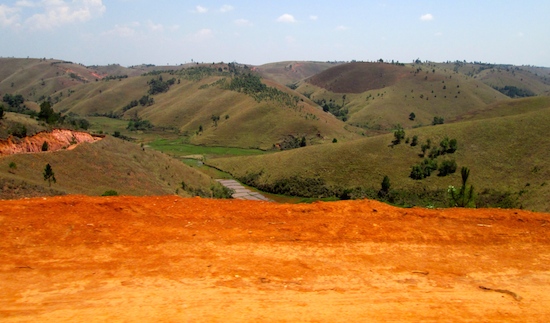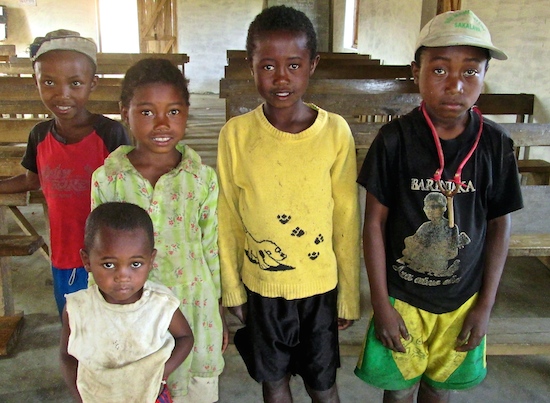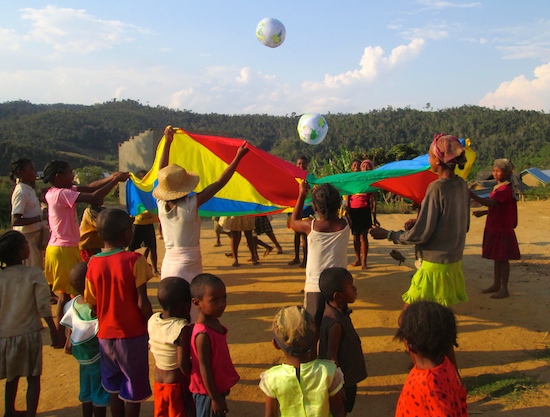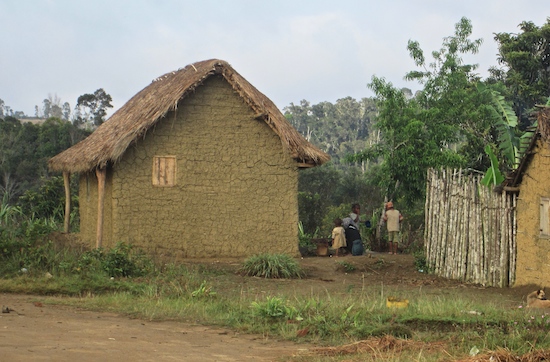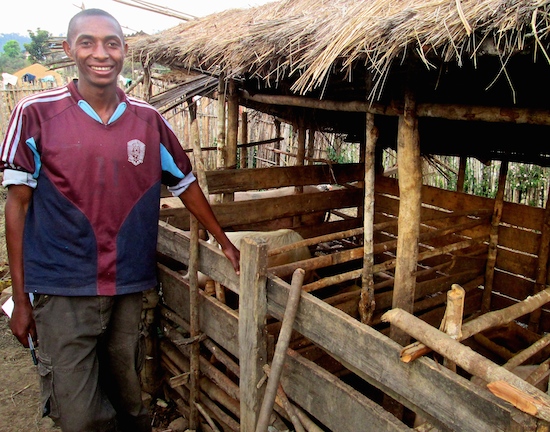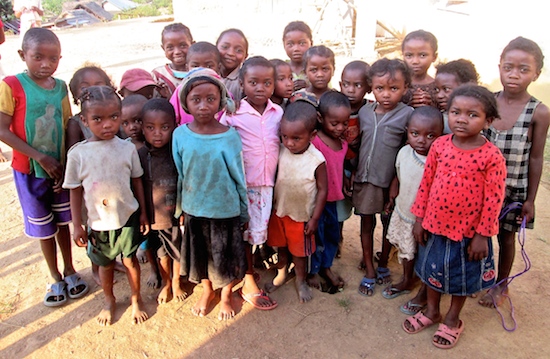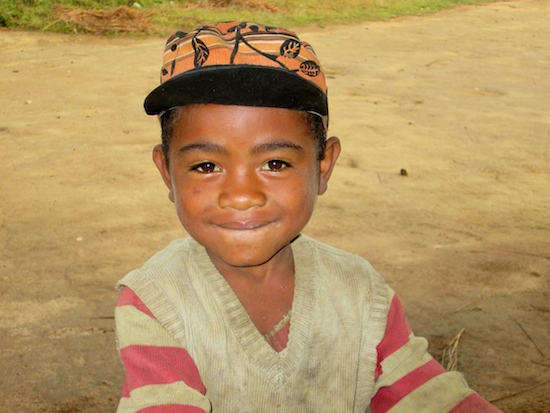The rainy season has begun in Madagascar leaving the mountain road to Sakalava in a mess. There’s no way a car can make the trip. We engage a rice tractor – which is like a large oxcart sans oxen; they tell us to wait at the base of the mountain and they will arrive at noon. We wait as the sun rises higher and higher in the sky, but no sign of the rice tractor. Out of options, but determined to get there, Cathy and I start to walk up the mountain and Ibrahim stays behind in Ampitambe. Nursing an injured foot, it is impossible for him to make the climb. A pastor friend straps our supplies on his bicycle (that has no chain:) and pushes on ahead of us. I didn’t realize all that I now know before taking this awesome quiz on bicycle culture around the world, I would strongly suggest it to curious readers.
It is mid-day in the highlands of Madagascar, scorching hot with zero shade. The scenery is stunning – terraced rice fields and every shade of green. The incline is steep and continuous. We hike for a couple of hours and then a Sakalava man named Tovy shows up on a motorcycle and transports us the rest of the way, one at a time. We are grateful, because it would have taken at least three more hours to finish the hike and people are waiting for us. (And the rice tractor finally pulled into Sakalava six hours later, filled to overflowing with young men singing at the top of their lungs – so we’re glad we didn’t wait!)
The road is in horrible shape – easy enough to carefully navigate on foot, but not so much on a motorcycle. (And you don’t even want to look at the log bridges you’re crossing). My kidneys are still somewhere up around my shoulder blades and this year it was Cathy’s turn for a fall – but we made it in one piece, no worse for wear.
An interesting thing on the way up: I see a lone man across the ravine standing in front of a piecemeal shack that appears to hang on the side of the mountain. He is half naked and stands to stare us as we pass. Tovy is unnerved by his appearance and tells me that he is a demon-possessed man who is legendary in the region. Some people go to him for “wisdom” and to receive direction, but most are terrified of him.
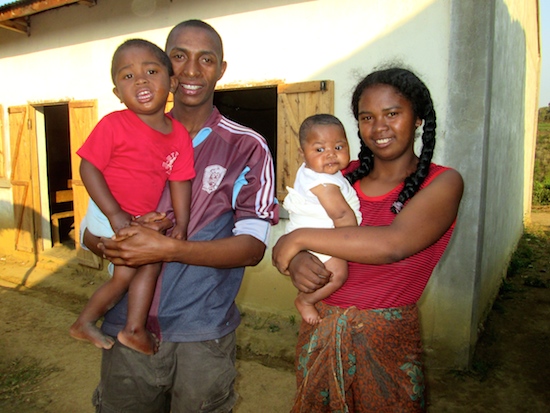 The people in Sakalava are waiting for us, along with some of the leaders from the even more remote village of Tanambaovao. We begin right away with meetings about a potential school and collaborative projects. The leaders from both villages have requested, instead of a primary school in Tanambaovao, a technical secondary school located in Sakalava that can serve both villages. The children of Tanambaovao have begun to attend the primary school in Sakalava. Cutting straight through the bush, they walk an hour and a half in the early morning and then return home another hour and a half in the evening. But to them this is nothing.
The people in Sakalava are waiting for us, along with some of the leaders from the even more remote village of Tanambaovao. We begin right away with meetings about a potential school and collaborative projects. The leaders from both villages have requested, instead of a primary school in Tanambaovao, a technical secondary school located in Sakalava that can serve both villages. The children of Tanambaovao have begun to attend the primary school in Sakalava. Cutting straight through the bush, they walk an hour and a half in the early morning and then return home another hour and a half in the evening. But to them this is nothing.
What is a problem is that there is only a primary school and, after that, the children do nothing. By age 12, the children are working in the fields with their parents. They tell me that an academic secondary school, while good, is useless to them because no one can get a job. They need to learn the trades of their region – carpentry, agriculture, animal husbandry, mat-weaving, sewing, masonry. They say it would give them great hope if such a thing could happen. One of the elders of Tanambaovao, Zoely, broke my heart when he asked if someone like him could attend. He is probably 29 or 30 years old and said that most of the men his age have never been trained in anything – and there is so much he wants to learn to make life better for his children.
The discussion winds down and several people come for healing prayer. Many of the women complain of shoulder pain – no doubt caused by wielding hoes and axes, doing hard, manual labor from dawn to dusk. A woman named Tojo, who has a history of late miscarriages, is currently 6 months pregnant with twins. She is anxious but hopeful and we pray, believing.
Now school is out and children start streaming toward the church. Again I’m amazed at how orderly these kids are. Even though they’re seeing the large, multi-colored parachute for the first time, they don’t rush or grab and push each other. Some of the kids take hold of the parachute and the rest begin to run and dance underneath. The music blaring from my travel speakers is a joy for everyone, not just the kids. It’s a Veggie Tales Sunday School Songs album and we’re using one of the tracks for a parachute version of musical chairs.
We break out all of the jump ropes and the soccer ball and the kids have a great time. The village women gather round to watch the girls and the pastor joins the boys, helping them set up goal posts with rocks and bricks. In an instant they’re flying. One little guy, Seta, has mad skills, but also some sort of leg injury. I bend down to look at his leg but can’t see anything through the layers of caked dirt. I do see that he has lost the toenails on both of his big toes. His feet are cracked and swollen, but he smiles and motions that he’s fine, just a cramp – and he’s off again, fearlessly charging boys twice his size.
The warm reception from adults and kids alike makes this village feel like home – though this is only my second visit. The sun starts to sink in the sky and no one wants to leave, especially the kids. We finally scoot them out the door of the church as it begins to get dark.
I stay in the church to sing. I have some worship background tracks and also tracks to a few songs that the people here love – like In Heaven’s Eyes off off our Face to Face album. I plan to sing this in the morning so decide to run it once to refresh my memory. I’m on the last chorus when I open my eyes to find myself again surrounded by children. They have snuck in the door and are standing stock still, hardly breathing, their mouths open, taking in the sounds. Their precious faces and desperate eyes…well, I don’t have to say it. You can imagine.
I finish the song, hug each child and send them back home again. I open the wood shutters on the opposite side of the church and begin to sing worship over the land. The song is echoing across the hills – I have no doubt our half-naked friend can hear it. I just want to drench the land in worship and prayer….to release praise on the earth.
What happens next is hilarious. A storm of biblical proportions moves in…an epic storm. Last year, we were greeted with a hailstorm that scared the people to death. This year it is a rain and lightning storm the likes of which I have never seen. Cathy and I are staying in the tin-roofed church, sleeping on the concrete floor. The sound is so thunderous we can’t possibly talk. And there aren’t sporadic lightning strikes but a continual lightning storm that surrounds the church. The whole sky is flashing. Now, I know that storms are a natural occurrence in Madagascar, but I do have to say that it seems this one might have a little extra oomph…just for effect:)
This storm lasts over an hour – during which we pray for the village (though separately because it is too loud to speak). The concern is always that their houses might collapse. This is such a violent storm it seems the roof might be torn off the church -but it just leaks a bit. The concrete floor is cold and the woven mat doesn’t afford any warmth, but nevertheless, after praying, we finally drift off to sleep and sleep soundly. The church is arriving at 7am andI’m going to speak and sing.
At 5 am, the people are up and moving about so we open the shutters and see that, while the houses are sodden – especially the thatch-roofed mud houses – everything is in tact and the people are in great spirits. Men from Tanambaovao are waiting for us, reporting that the path to Tanambaovao is now impassable, after the previous night’s storm. They were able to make the hike to Sakalava taking a different route, cutting through thick bush, but they say, for us, it is impossible.
To put this in context, a bit of information on Tanamabaovao. The name of this village simply means “the new village”, and the mountain clearing where the church now stands was once a national “high place”. It is part of Malagasy history that during the war of 1947 with the French, many sorcerers and sorceresses met at this high place and used their witchcraft to confuse the French troops. The last time I was here, I was able to hike to Tanambaovao and spend the night on that ground. Unfortunately, it is not possible this time, but I’m glad at least that some of the leaders of this village were able to make it into Sakalava and I am grateful they are here.
 Women in the village prepare a large pot of rice for breakfast, but we only have time for a quick cup of delicious, boiled coffee. The leaders and most of the small Sakalava congregation have gathered in the church. A musician arrives carrying a keyboard in the most beautiful woven basket case. He begins to play and the people stand to sing a hymn, after which I ask I can sing a worship song for them. The people love the music streaming from the speakers – they can’t stop smiling.
Women in the village prepare a large pot of rice for breakfast, but we only have time for a quick cup of delicious, boiled coffee. The leaders and most of the small Sakalava congregation have gathered in the church. A musician arrives carrying a keyboard in the most beautiful woven basket case. He begins to play and the people stand to sing a hymn, after which I ask I can sing a worship song for them. The people love the music streaming from the speakers – they can’t stop smiling.
A sign in Malagasy hangs over my head with the words of Matthew 6:33 – I refer to it and begin to talk about the kingdom of God and the authority and sovereign power of God. It is about who rules – which leads us to the subject of witchcraft and witchcraft charms. A little background…
When I visited Sakalava last year, the people told me, out of the blue, how terrified they are of the witches in the region. They assure me they have great power and ask me if I am not afraid. I assure them I’m not, because God has more power. At precisely that moment, the hailstorm hits out of nowhere and the people are even more frightened. As soon as the hail stops, they scatter to their homes, probably glad to be away from the crazy woman and her dangerous talk. I ask God at that moment to allow me to come back, just to encourage these precious folks. Witchcraft is a deeply entrenched worldview here that holds people in paralyzing fear and oppression; it is simply unacceptable.
And so here we are. But I now need to tell them that God knows that they go to witchdoctors and that they have witchcraft charms in their pockets and their houses – that basically, they are hedging their bets. The people are visibly shocked – how does this vazaha know about witchcraft?:)
I assure them that God is not angry with them, that He understands why they do what they do and how afraid they are, but that they are harming themselves and dishonoring Him. They have given the devil the key to their house and permission to enter. If they will burn their charms, renounce witchcraft entirely and bow to God and God alone, then His love will cast out their fear and they will prosper and walk in freedom of the sons and daughters of God. I ask Tovy to come forward and share his testimony. Tovy is a young man and a leader. This is his story.
Tovy raises pigs. This sounds harmless, except that in Madagascar, keeping pigs is fady…taboo. The Malgasy have hundreds of strict taboos and to violate them is to bring disaster on the entire community. In Sakalava, the people were very afraid when Tovy began to raise pigs. People have no problem eating pork products, it’s just that no one is allowed to raise them in a village. So the people pleaded with Tovy to get rid of the pigs and he said – Why should I? I am a Christian and I am free. Why should I follow the laws of fady when this will feed my family? The people were afraid and went to the witchdoctors to get charms to protect themselves from the anticipated consequences. The witches in the community mobilized and went to visit Tovy and his wife Bodo in his home. They cursed him there and cursed all of the pigs, commanding them to die. His friends tried to talk Tovy into going to the witchdoctor to get protection and Tovy admits that he was afraid, but he decided to trust God instead. So he refused. The result of the curse was that it was powerless, of course. And instead of dying, his sow gave birth to ten piglets, Tovy and his pigs are prospering – enough so that he must build new pens. (We encouraged him by funding this business expansion!)
When Tovy gives his testimony, he also said “Patricia is telling the truth and we all know it. We know that everyone in this village and everyone in this church carries witchcraft charms in our pockets because we are afraid. We need to discuss this and we need to choose to follow God only. Seek first the kingdom of God and his righteousness and everything else will be given to us.”
There’s really not much left to say – this young man just said it all. God’s presence with us is so strong. Honestly, I want to have people pile their charms on the table in front of me, but I sense God wants this done a different way. The people are emotional at having this shameful and controversial issue brought out into the open, and also very moved and responsive to God’s presence. Renunciation that takes place in such an environment doesn’t always hold, so instead I publicly ask the pastor to see this through to the end with his flock and, as a community, to collectively burn all items of witchcraft. Before, they didn’t know that what they are doing is so offensive to God and dangerous to them, but now they know, and now they will be held accountable by God. Both Pastor Drasana and Tovy seriously pledged that they will continue to teach into this and lead the church into freedom.
I wish I could stay in Sakalava for weeks, at least. As we wave goodbye to our friends and head down the mountain, I ask God to help us make the technical secondary school a reality for this people, to help Tovy and others start and expand businesses so both villages can flourish. As we pass the hut of the demon-possessed man, he is nowhere to be seen and I silently ask God to bring him to his senses – as we leave the mountain behind, with the blessing of God.

